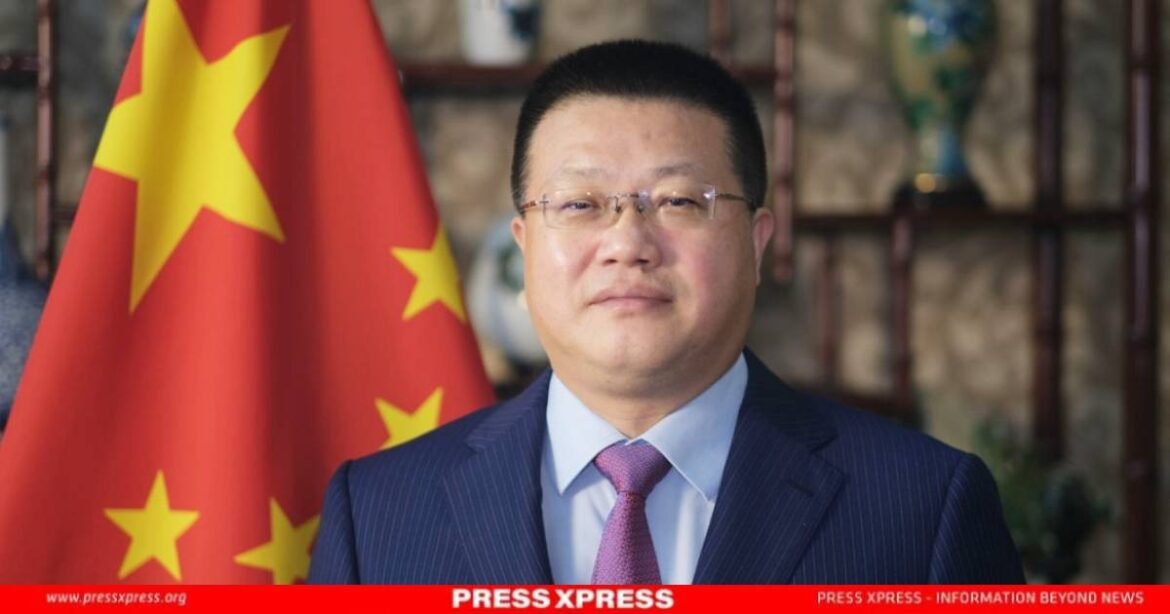In a post-visit briefing at the Chinese embassy in Dhaka, Ambassador Yao Wen hailed Prime Minister Sheikh Hasina’s recent official visit to Beijing as a ‘tremendous success’ for bilateral relations. The ambassador’s remarks came amidst criticisms from opposition groups, which he addressed during the Tuesday briefing.
You can also read: PM Hasina’s Beijing Visit: Boosting Bangladesh-China Trade
The PM’s three-day visit, spanning from July 8 to 10, saw Bangladesh and China elevate their relationship to a comprehensive strategic partnership level. This diplomatic upgrade represents a significant leap forward in the bilateral ties between the two nations, setting the stage for enhanced cooperation across multiple sectors.
Diplomatic Milestone: Elevated Partnership
Ambassador Yao emphasized the importance of this development, stating, “China-Bangladesh relations elevated to a higher level. Leaders of our two countries agreed to elevate the bilateral relationship to a comprehensive strategic cooperative partnership. This is the most important political outcome of the visit.”
Comprehensive Agreements and Memoranda of Understanding
During the visit, the two governments signed an impressive array of 21 MoU’s and agreements, covering a wide spectrum of sectors:
- Trade and investment
- Digital Economy
- Financial regulation
- Education Cooperation
- Medical care and public health
- Infrastructure cooperation
- Green and low carbon development
- Agricultural cooperation
- Hydrological forecasting
- Radio and television cooperation
Furthermore, seven new projects were announced, signaling a commitment to tangible outcomes from the visit. The business summit held alongside the official meetings also bore fruit, with private enterprises from both countries signing 16 additional MoU’s and agreements valued at $500 million.
Addressing Opposition Criticisms
Despite the achievements, some in Bangladesh questioned the visit’s success, citing the Prime Minister’s early return for her daughter’s illness and rumors of a shortened meeting with President Xi Jinping. Ambassador Yao addressed these concerns, clarifying that the early return was due to personal reasons and that all official programs had been completed.
On the subject of the meeting with President Xi, the ambassador provided a firsthand account: “I can tell you because I was there. I was at the spot. The meeting lasted almost 1 hour. I don’t know who told you about 30 minutes …it’s nonsense. I was there, I checked. Actually, it’s (lasted) more than we’re supposed to.”
He further elaborated on the content of the meeting, saying, “I saw the chemistry between the two leaders. They were in a very thorough discussion about how to alleviate poverty, the agriculture, development of the city, all the things we discussed in the visit.”
Substantial Financial Support Package
Another issue was the anticipated financial assistance. Ambassador Yao clarified that China’s total package, including grants, interest-free loans, concession loans, and commercial loans, amounts to $2 billion.
The ambassador outlined the next steps for this financial package: “We have discussed these facilities and the next step is up to the working level of the two countries to sit down to talk about the details of this arrangement and how to implement this financial support from China to Bangladesh.”
He expressed confidence in the impact of this support, stating, “I believe these funds will be used to construct vital infrastructure projects, enhance the quality of life for boundless people and mitigate the impact of disasters. This demonstrates the true essence of the comprehensive strategic partnership between our two countries.”
Key Outcomes and Future Directions
Ambassador Yao highlighted several key outcomes of the visit:
- Elevated bilateral relations to a comprehensive strategic cooperative partnership
- Increased political mutual trust
- Bangladesh’s reaffirmation of the one-China principle
- Discussions on Global Development Initiative (GDI), Global Security Initiative (GSI), and Global Civilization Initiative (GCI)
- Chinese support for Bangladesh’s Southern Integrated Development Initiatives (SIDI)
He emphasized China’s commitment to supporting Bangladesh’s development goals, saying, “The Chinese side will continue to firmly support Bangladesh in maintaining peace and stability, realizing development goals as envisioned under Vision 2041, non-interference in its internal affairs, and independently choosing a development path suited to its national conditions.”
Expanded Scope of Cooperation
The Joint Statement resulting from the visit covers an expansive 17 areas of cooperation, encompassing various aspects of Bangladesh’s economic and social development. These include:
- Politics and political parties
- Trade and commerce
- Major cooperation projects
- Finance
- Digital and ICT
- Agriculture
- Meteorology
- Water management
- Ecological protection
- Health
- Education
- People-to-people exchanges
- Maritime and blue economy
- Archaeology
- Defense
- Multilateral affairs cooperation
Ambassador Yao stressed the broader implications of this expanded cooperation, stating, “China-Bangladesh cooperation goes beyond the bilateral scope and is committed to jointly maintaining world peace and stability, safeguarding the common interests of developing countries, and international fairness and justice.”
Looking Ahead: A Stronger Partnership
As Bangladesh and China move forward with their newly elevated partnership, the outcomes of this visit are expected to shape the future of their relations across multiple sectors. The comprehensive nature of the agreements and the substantial financial support package underscore the commitment of both nations to deepen their ties.
The ambassador’s confident assessment of the visit as a ‘tremendous success’ reflects the positive momentum in China-Bangladesh relations. As both countries work to implement the various agreements and initiatives discussed during the visit, observers will be watching closely to see how this enhanced partnership translates into tangible benefits for both nations and the broader region.


